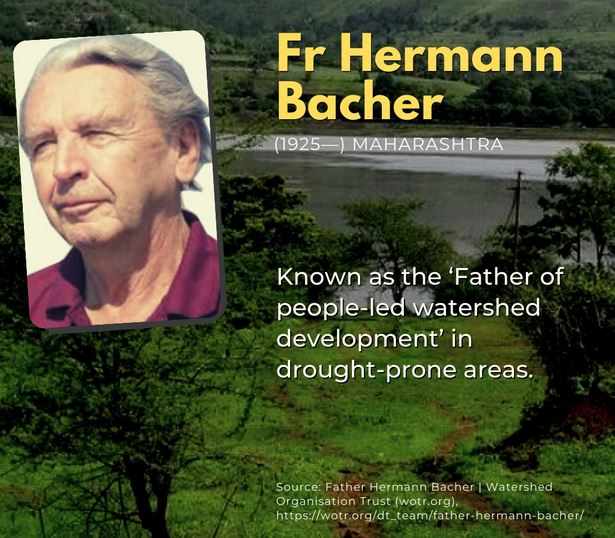Note4Students
From UPSC perspective, the following things are important :
Prelims level: Hermann Bacher
Mains level: Watershed development in India

Hermann Bacher, popularly known as the ‘father of community-led watershed development in India’, passed away at the ripe old age of 97 years in Switzerland September 14, 2021.
Hermann Bacher
- Born in 1924, Bacher, came to India in 1948 at the young age of 24 years.
- He was to spend the next 60 years of his life here, most of it in Maharashtra.
- Struck by the poverty he saw in rural Maharashtra, he dedicated his life to the upliftment of the poor, the landless and rural women.
- Bacher was given Germany’s highest civilian award, the Federal Cross of the Order of Merit in 1994, in recognition of his outstanding efforts.
- In 2017, the United Nations Convention to Combat Desertifiucation (UNCCD) awarded WOTR the prestigious ‘Land for Life Award 2017’.
- He is widely regarded and respected as a true ‘man of God’ for whom selfless service of the poor was worship at its most sublime. He is fondly remembered as ‘Bacher Baba’.
Notable works
- The 1972 droughts in Maharashtra led him to re-calibrate his developmental approach.
- This meant that in rain-dependent rural Maharashtra, a shift had to be made from ‘resource exploitation’ to sustainable resource use, or ‘resource mobilisation’, as he described it.
- He helped thousands of landless labourers’ secure title to land under the Land Reforms Act, 1957, beginning in 1965.
- He also organised lakhs of farmers to develop their farms and increase their agricultural productivity by helping them access irrigation, improved and hybrid seeds etc.
Pioneering water harvest
- Since rain fell in the watersheds and landscapes villagers lived in, the only way to harvest and conserve rainwater wherever it fell was to undertake watershed development measures.
- The idea was that “running water must be made to walk; walking water made to stop and sink underground”.
- This meant, planting trees and grasses, conserving forests, undertaking soil and water conservation works such as digging contour trenches, raising farm bunds, etc.
- It also meant building water harvesting structures on the streams (check dams, earthen bunds, etc) in a systematic manner across the entire landscape of the village, beginning from the top.
Establishing the IGWDP
- Through his work, was born the idea which later became the large-scale Indo-German Watershed Development Program (IGWDP) that he conceived and launched in Maharashtra in 1989.
- This was in collaboration with and the support of the Governments of India, Maharashtra and Germany, NABARD and the non-profit sector.
- Its unique and ground-breaking feature was that it put the villagers in the driver’s seat — the community would plan the programme, implement it and maintain the watershed assets.
- Funds, substantial amounts, would be given directly to them and they would have to manage and account
UPSC 2022 countdown has begun! Get your personal guidance plan now! (Click here)
Get an IAS/IPS ranker as your 1: 1 personal mentor for UPSC 2024
